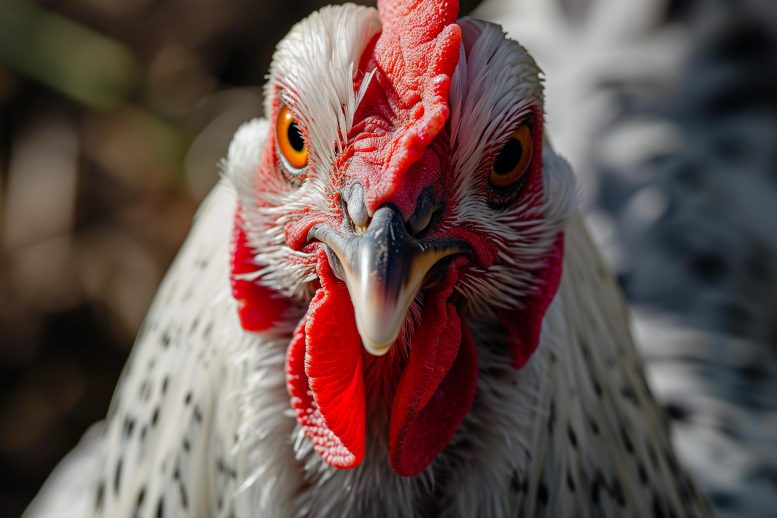
Researchers at the University of Queensland have discovered that people can understand chickens’ emotional states from their clucking sounds. This ability, unaffected by prior experience with chickens, has significant implications for improving poultry welfare and could aid in developing AI-based monitoring systems. Credit: SciTechDaily.com
A study reveals that humans can accurately discern chickens’ emotions from their clucks, a finding that could enhance chicken welfare and inform consumer choices.
A University of Queensland-led study has found humans can tell if chickens are excited or displeased, just by the sound of their clucks.
Professor Joerg Henning from UQ’s School of Veterinary Science said researchers investigated whether humans could correctly identify the context of calls or clucking sounds made by domestic chickens, the most commonly farmed species in the world.
Study Methodology and Findings
“In this study, we used recordings of chickens vocalizing in all different scenarios from a previous experiment,” Professor Henning said.
“Two calls were produced in anticipation of a reward, which we called the ‘food’ call and the ‘fast cluck’.
“Two other call types were produced in non-reward contexts, such as food being withheld, which we called the ‘whine’ and ‘gakel’ calls.”
The researchers played the audio files back to test whether humans could tell in which context the chicken sounds were made, and whether various demographics and levels of experience with chickens affected their correct identification.
Implications for Chicken Welfare
“We found 69 percent of all participants could correctly tell if a chicken sounded excited or displeased,” Professor Henning said.
“This is a remarkable result and further strengthens evidence that humans have the ability to perceive the emotional context of vocalizations made by different species.”
Professor Henning said the ability to detect emotional information from vocalization could improve the welfare of farmed chickens.
“A substantial proportion of participants being able to successfully recognize calls produced in reward-related contexts is significant,” he said.
“It provides confidence that people involved in chicken husbandry can identify the emotional state of the birds they look after, even if they don’t have prior experience.”
Future Research and Applications
“Our hope is that in future research, specific acoustic cues that predict how humans rate arousal in chicken calls could be identified, and these results could potentially be used in artificially intelligent based detection systems to monitor vocalizations in chickens,” Professor Henning said.
“This would allow for the development of automated assessments of compromised or good welfare states within poultry management systems.
“Ultimately this could enhance the management of farmed chickens to improve their welfare, while helping conscientious consumers to make more informed purchasing decisions.”
This research has been published in the journal Royal Society Open Science.
Reference: “Humans can identify reward-related call types of chickens” by Nicky McGrath, Clive J. C. Phillips, Oliver H. P. Burman, Cathy M. Dwyer and Joerg Henning, 3 January 2024, Royal Society Open Science.
DOI: 10.1098/rsos.231284









It would really have “made” the article if audio were included. Perhaps you’d consider a follow-up?
Audio would be nice. But I’ve pretty well deciphered my pet hens vocalizations..I think. A happy hen makes slow clucks..an excited hens clucks are more intense.
The most surprising thing about this study is that the result was surprising at all! Did David Attenborough teach us nothing? Obviously the authors were not raised on a farm 😂
Exactly my thoughts…well said!
To add to these findings, let me state that many rural Africans have for the past several centuries been able to tell when chickens are afraid, when there’s a predator in their territory, when they are hungry, when they are satisfied, when they are excited and playful and so on and so forth. It might be worthwhile to interview some cross-section of rural Africans to delve into this assertion I’ve just made. It will widen the scope and depth of the research findings.
While I’m excited to hear confirmed what many people were already aware of without an official scientific conclusion(to the end of ego grabbing and self glorification perhaps?), 69% hardly seems conclusive. I agree that birds are emotionally compatible with humans, that is to say, those who live and interact with us will develop behaviors and reactions that are more compatible with our own. But it’s deflating to read that apparently the goal is to pass on the care of the animals to ai.bitterly ironic, perhaps. We we’ve finally established(if somewhat dubiously in my opinion) that we understand these animals speech patterns, only so we can pass the responsibility on to a non human entity who is emotionally unavailable and not really capable of empathy or compassion.
We’ve been able to understand the communications of domestic dogs, cats, donkeys, cows, horses, and various other domestic animals for centuries. Who wasted a study on this? Animals are incapable of hiding their emotions because they lack certain brain functions only humans have. They lack the default mode network, so they are incapable of self-analysis. This results in them consistently communicating their less complex emotions at all times. You just have to learn to read the cues.
Buy “Happy eggs”! Confirmed by Science!
Democrats have finally dumbed down America to the same level as a chicken. Next, what’s for dinner?
The study was done in Australia… as the very first 4 words of the article state..
Did you miss that part of the article, just want to be ignorant, or do you simply not know geography?
Danger Mr Robinson
This brought many thoughts to mind.
In addition to nearly every previous comment(minus the political nonsense by someone lacking the capacity for critical thinking), it seems that what’s being presented is the closest thing to proof that those who dont understand them and or continue to treat them poorly simply do not care.
Which lays the groundwork for…is it really animal husbandry if it’s actually animal abuse?
I think this article also partially assumes that commercial farms actually give a cluck when in reality most don’t, though it did mention it would be up to the conscientious consumer.
I am surprised how people and even the scientists can define these amazing birds as commodities or products still after the study clearly shows that they have a subjective experience.
To anyone who has spent their lives around animals this study is ridiculously obvious.
This is like a headline saying,”Scientists discover that we have two feet.”
No.
My youngest sister said that she would just use the phrase “KFC” to get the chickens to
roost quietly……….
I have raised orphaned baby chicks and found through their different calls what they want be it food, water, or comfort. My favorite “song” is when they want to go to bed and i get the pressure of a sweater on top (to mimick the mom sitting on em) theyll start singing the prettiest little song when they are happy with it and drift off to sleep. Animals are awesome.